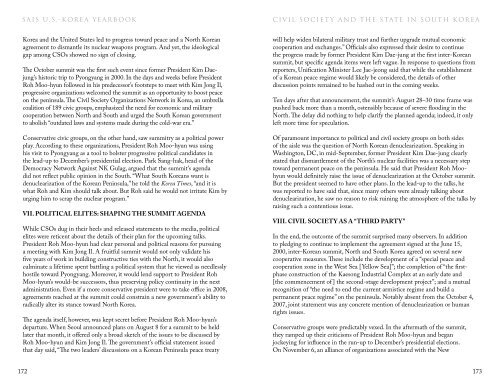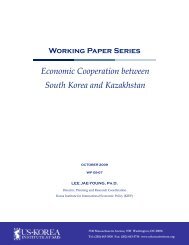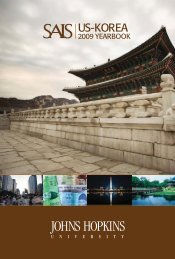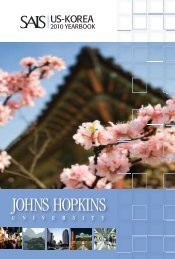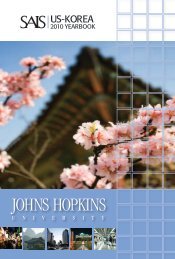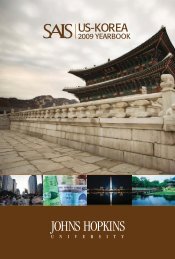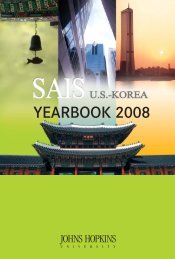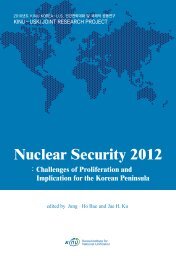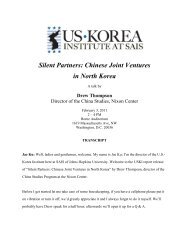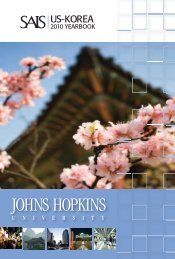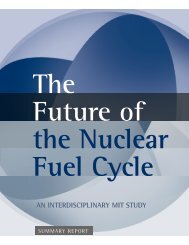Civil Society and the State in South Korea, by Michael Richardson
Civil Society and the State in South Korea, by Michael Richardson
Civil Society and the State in South Korea, by Michael Richardson
Create successful ePaper yourself
Turn your PDF publications into a flip-book with our unique Google optimized e-Paper software.
SAIS U.S.-KOREA YEARBOOK<br />
CIVIL SOCIETY AND THE STATE IN SOUTH KOREA<br />
<strong>Korea</strong> <strong>and</strong> <strong>the</strong> United <strong>State</strong>s led to progress toward peace <strong>and</strong> a North <strong>Korea</strong>n<br />
agreement to dismantle its nuclear weapons program. And yet, <strong>the</strong> ideological<br />
gap among CSOs showed no sign of clos<strong>in</strong>g.<br />
The October summit was <strong>the</strong> first such event s<strong>in</strong>ce former President Kim Daejung’s<br />
historic trip to Pyongyang <strong>in</strong> 2000. In <strong>the</strong> days <strong>and</strong> weeks before President<br />
Roh Moo-hyun followed <strong>in</strong> his predecessor’s footsteps to meet with Kim Jong Il,<br />
progressive organizations welcomed <strong>the</strong> summit as an opportunity to boost peace<br />
on <strong>the</strong> pen<strong>in</strong>sula. The <strong>Civil</strong> <strong>Society</strong> Organizations Network <strong>in</strong> <strong>Korea</strong>, an umbrella<br />
coalition of 189 civic groups, emphasized <strong>the</strong> need for economic <strong>and</strong> military<br />
cooperation between North <strong>and</strong> <strong>South</strong> <strong>and</strong> urged <strong>the</strong> <strong>South</strong> <strong>Korea</strong>n government<br />
to abolish “outdated laws <strong>and</strong> systems made dur<strong>in</strong>g <strong>the</strong> cold-war era.”<br />
Conservative civic groups, on <strong>the</strong> o<strong>the</strong>r h<strong>and</strong>, saw summitry as a political power<br />
play. Accord<strong>in</strong>g to <strong>the</strong>se organizations, President Roh Moo-hyun was us<strong>in</strong>g<br />
his visit to Pyongyang as a tool to bolster progressive political c<strong>and</strong>idates <strong>in</strong><br />
<strong>the</strong> lead-up to December’s presidential election. Park Sang-hak, head of <strong>the</strong><br />
Democracy Network Aga<strong>in</strong>st NK Gulag, argued that <strong>the</strong> summit’s agenda<br />
did not reflect public op<strong>in</strong>ion <strong>in</strong> <strong>the</strong> <strong>South</strong>. “What <strong>South</strong> <strong>Korea</strong>ns want is<br />
denuclearization of <strong>the</strong> <strong>Korea</strong>n Pen<strong>in</strong>sula,” he told <strong>the</strong> <strong>Korea</strong> Times, “<strong>and</strong> it is<br />
what Roh <strong>and</strong> Kim should talk about. But Roh said he would not irritate Kim <strong>by</strong><br />
urg<strong>in</strong>g him to scrap <strong>the</strong> nuclear program.”<br />
VII. POLITICAL ELITES: SHAPING THE SUMMIT AGENDA<br />
While CSOs dug <strong>in</strong> <strong>the</strong>ir heels <strong>and</strong> released statements to <strong>the</strong> media, political<br />
elites were reticent about <strong>the</strong> details of <strong>the</strong>ir plan for <strong>the</strong> upcom<strong>in</strong>g talks.<br />
President Roh Moo-hyun had clear personal <strong>and</strong> political reasons for pursu<strong>in</strong>g<br />
a meet<strong>in</strong>g with Kim Jong Il. A fruitful summit would not only validate his<br />
five years of work <strong>in</strong> build<strong>in</strong>g constructive ties with <strong>the</strong> North, it would also<br />
culm<strong>in</strong>ate a lifetime spent battl<strong>in</strong>g a political system that he viewed as needlessly<br />
hostile toward Pyongyang. Moreover, it would lend support to President Roh<br />
Moo-hyun’s would-be successors, thus preserv<strong>in</strong>g policy cont<strong>in</strong>uity <strong>in</strong> <strong>the</strong> next<br />
adm<strong>in</strong>istration. Even if a more conservative president were to take office <strong>in</strong> 2008,<br />
agreements reached at <strong>the</strong> summit could constra<strong>in</strong> a new government’s ability to<br />
radically alter its stance toward North <strong>Korea</strong>.<br />
The agenda itself, however, was kept secret before President Roh Moo-hyun’s<br />
departure. When Seoul announced plans on August 8 for a summit to be held<br />
later that month, it offered only a broad sketch of <strong>the</strong> issues to be discussed <strong>by</strong><br />
Roh Moo-hyun <strong>and</strong> Kim Jong Il. The government’s official statement issued<br />
that day said, “The two leaders’ discussions on a <strong>Korea</strong>n Pen<strong>in</strong>sula peace treaty<br />
will help widen bilateral military trust <strong>and</strong> fur<strong>the</strong>r upgrade mutual economic<br />
cooperation <strong>and</strong> exchanges.” Officials also expressed <strong>the</strong>ir desire to cont<strong>in</strong>ue<br />
<strong>the</strong> progress made <strong>by</strong> former President Kim Dae-jung at <strong>the</strong> first <strong>in</strong>ter-<strong>Korea</strong>n<br />
summit, but specific agenda items were left vague. In response to questions from<br />
reporters, Unification M<strong>in</strong>ister Lee Jae-jeong said that while <strong>the</strong> establishment<br />
of a <strong>Korea</strong>n peace regime would likely be considered, <strong>the</strong> details of o<strong>the</strong>r<br />
discussion po<strong>in</strong>ts rema<strong>in</strong>ed to be hashed out <strong>in</strong> <strong>the</strong> com<strong>in</strong>g weeks.<br />
Ten days after that announcement, <strong>the</strong> summit’s August 28–30 time frame was<br />
pushed back more than a month, ostensibly because of severe flood<strong>in</strong>g <strong>in</strong> <strong>the</strong><br />
North. The delay did noth<strong>in</strong>g to help clarify <strong>the</strong> planned agenda; <strong>in</strong>deed, it only<br />
left more time for speculation.<br />
Of paramount importance to political <strong>and</strong> civil society groups on both sides<br />
of <strong>the</strong> aisle was <strong>the</strong> question of North <strong>Korea</strong>n denuclearization. Speak<strong>in</strong>g <strong>in</strong><br />
Wash<strong>in</strong>gton, DC, <strong>in</strong> mid-September, former President Kim Dae-jung clearly<br />
stated that dismantlement of <strong>the</strong> North’s nuclear facilities was a necessary step<br />
toward permanent peace on <strong>the</strong> pen<strong>in</strong>sula. He said that President Roh Moohyun<br />
would def<strong>in</strong>itely raise <strong>the</strong> issue of denuclearization at <strong>the</strong> October summit.<br />
But <strong>the</strong> president seemed to have o<strong>the</strong>r plans. In <strong>the</strong> lead-up to <strong>the</strong> talks, he<br />
was reported to have said that, s<strong>in</strong>ce many o<strong>the</strong>rs were already talk<strong>in</strong>g about<br />
denuclearization, he saw no reason to risk ru<strong>in</strong><strong>in</strong>g <strong>the</strong> atmosphere of <strong>the</strong> talks <strong>by</strong><br />
rais<strong>in</strong>g such a contentious issue.<br />
VIII. CIVIL SOCIETY AS A “THIRD PARTY”<br />
In <strong>the</strong> end, <strong>the</strong> outcome of <strong>the</strong> summit surprised many observers. In addition<br />
to pledg<strong>in</strong>g to cont<strong>in</strong>ue to implement <strong>the</strong> agreement signed at <strong>the</strong> June 15,<br />
2000, <strong>in</strong>ter-<strong>Korea</strong>n summit, North <strong>and</strong> <strong>South</strong> <strong>Korea</strong> agreed on several new<br />
cooperative measures. These <strong>in</strong>clude <strong>the</strong> development of a “special peace <strong>and</strong><br />
cooperation zone <strong>in</strong> <strong>the</strong> West Sea [Yellow Sea]”; <strong>the</strong> completion of “<strong>the</strong> firstphase<br />
construction of <strong>the</strong> Kaesong Industrial Complex at an early date <strong>and</strong><br />
[<strong>the</strong> commencement of ] <strong>the</strong> second-stage development project”; <strong>and</strong> a mutual<br />
recognition of “<strong>the</strong> need to end <strong>the</strong> current armistice regime <strong>and</strong> build a<br />
permanent peace regime” on <strong>the</strong> pen<strong>in</strong>sula. Notably absent from <strong>the</strong> October 4,<br />
2007, jo<strong>in</strong>t statement was any concrete mention of denuclearization or human<br />
rights issues.<br />
Conservative groups were predictably vexed. In <strong>the</strong> aftermath of <strong>the</strong> summit,<br />
<strong>the</strong>y ramped up <strong>the</strong>ir criticisms of President Roh Moo-hyun <strong>and</strong> began<br />
jockey<strong>in</strong>g for <strong>in</strong>fluence <strong>in</strong> <strong>the</strong> run-up to December’s presidential elections.<br />
On November 6, an alliance of organizations associated with <strong>the</strong> New<br />
172 173


